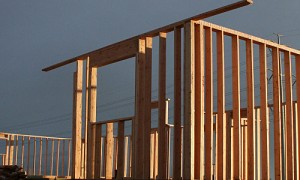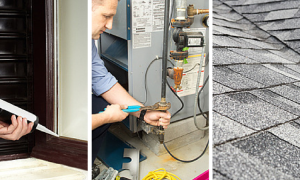House settling occurs when your house is getting used to life in its new location. Typically, a new house settles during its first three years of existence. House settling shouldn’t cause major issues — just cosmetic ones, such as a thin crack where the wall meets the ceiling, which can be patched up with a bit of Spackle.
Thin cracks might also appear in the foundation, but if it was constructed properly, they aren’t a major issue. Philadelphia’s building code, for example, has specific rules regarding the depth of foundations to prevent certain types of damage.
However, some cracks indicate more than mere settling issues. Older homes in Philadelphia might not be up to code or might suffer damage due to changes in the surrounding soil. Here are some warning signs, and tips on how to deal with them:
Check for Cracks
Even a small crack in your house’s foundation can cause problems. The crack might not indicate structural problems, but it can be wide enough to let in water and pests, such as termites. While you want to repair any size foundation crack, you want to be particularly wary of horizontal cracks, cracks that are wider at the top than at the bottom, and uneven cracks — meaning the wall on one side of the crack is lower than the wall on the other side.
Depending on the severity of the crack, you might need to hire a professional company to fix it. The cost to fix a damaged foundation and to prevent further structural issues in the home varies widely. In Philadelphia, costs can be low as $1,500, but major problems will come with a much higher price tag.
Look for Sticky Doors
Doors and windows that stick, jam, or won’t open without a struggle are another sign that your home is in bad condition, beyond basic house settling. The interior doors can reveal structural problems in a number of ways. For example, the door might not fit in its frame properly, causing it to stick as you shut it. It might swing back and forth when you open the door, instead of staying in one place.
You can fix any issues with doors by repairing the doors themselves, but that type of repair only addresses the superficial problem, not the issues with the house. Repairing the structural issue, or propping up a house that has tilted, can cost thousands of dollars.
Be Concerned About Slanted Floors
In the sitcom How I Met Your Mother, two characters move into a New York apartment only to realize that the floors are slanted so much that they can luge across the floor on a skateboard. While the show played the slanted floor for laughs, a slanted floor in your home isn’t so funny. The issue can be relatively mild, especially if it resulted from a botched repair that left the floor uneven. But a sloping floor can also signal a more serious issue, such as rotted floor joists or supports, or a foundation that has cracked.
If you believe your home is suffering from serious structural issues, or just aren’t sure, it’s helpful to call a professional. The city maintains a list of Philadelphia licensed contractors who can evaluate the situation in your home and recommend the appropriate repairs. Although some repairs can be do-it-yourself projects, when it comes to the foundation of your home, you typically want to work with the pros.
Read more about homeowner tips and resources here.
[cf]skyword_tracking_tag[/cf]







WOW…I cannot find an answer to cracks only on the second floor, and it was after the prior owners, dormered those bedrooms. The house was built in the 50’s, so its not “new house settling”. Every answer is about the foundation. The foundation has no cracks at all, and neither does the first floor. NONE.
The main cracks are above and to the side, of windows that were replaced about 15 years ago. If there is NO cracking in the basement or first floor, is that a better case scenerio?
you should try going into crawl space and look for cracks. that is…if your feeling adventurous?
[…] in the foundation, or fresh plaster and paint inside. Cracks and bulges in the walls, windows and doors that stick and jam, and even drawers that will not stay shut can indicate problems in the foundation. Foundation […]
Great article, very informative. There are some things that you can do to help prevent foundation issues, one is called soaking. You can do this with a soaker hose around your foundation to keep the soil moist during the dry season. This helps keep the soil from shrinking. For more tips this is a good read: http://www.foundationrepairspringfield.com/
Hope you found this helpful!
I woke up this morning thinking someone was trying to break in. Is the house settling with so much force, that it sounds like someones kicking the door in? Im doing work to the house, and had to drill a hole in the foundation to get to the baseboard. just a tiny square foot to reach the copper pipes, did the trick. Its a double foundation, and i dont think the builders were pros, because they left construction unreachable.
This mornings bang at the front door didnt alarm me. im used to hearing the house settle. its a really old house, that was gutted and repaired.
The fact that i had to jackhammer through the side of the house to get one little 3/4 inch baseboard pipe, is just screwed up. is that a lawsuit, for intentional repair? they certainly didnt do a good job with the room im redoing.
I’ve always lived in old homes, and -yeah it bothers me, and i never get used to the house settling. At least there are no leaks, because thats the worst!